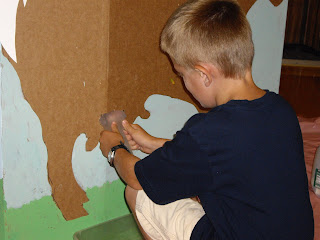
Here’s the outline/script for Kiddie Blythe Days. Thanks to all the adults for helping make it run smoothly.
The House on 5th Street

A. Rosebushes
Explain: Grandpa Howard loved Grandma Ethel very much. When Grandpa Howard would come home after a long, hard day at work, he would stop by one of the rose bushes that lined the driveway, take out his pocketknife and cut off a rose. He would give the rose to Grandma with a kiss.
Activities:
1. Play Ring around the Rosies.
2. Cut off/take a rose from the rose bush. Pretend to give it to someone. (‘cept I forgot to give the lollipop roses out. They are still in the bag. Sorry, kiddies. )
B. Basketball Standard/ Baton Twirling
Explain: Grandpa Howard and Grandma Ethel had 4 boys. They liked to play sports like football, baseball and basketball. They had a basketball hoop in their driveway and played a lot. This was hard on the rosebushes. Candy liked to twirl the baton.

Activities:
1. Try to make a basket
2. Twirl the Baton
C. The Fig tree
Explain: Grandpa Howard and Grandma Ethel had a fig tree in the backyard. The figs were good to eat but the outside was fuzzy.
Activities:
1. Give out Fig Newton cookies
Cibola
A. Horses and Cattle
Explain: Grandpa Howard had a ranch in Cibola. He had horses and cattle. Grandpa was very good with horses. They liked him. He had a horse named Babe and one called Butter Bob.
Activities:
1. Stick horse races. (Timed)
2. Pin the Tail on the Horse Rump

B. Cattle
Explain: Cowboys use a brand to make sure their cattle don’t get lost. A branding iron is a tool to mark the hide of the calf. The metal rod is heated in fire and applied to a spot near the rear of the calf. Grandpa’s brand was called the Rafter T.
Sometimes Grandpa would have to shoe a horse. Horses wear shoes to protect their feet and help them carry heavy work loads.
Activities:
1. Branding activity

2. Horseshoe game
3. Longhorn steer roping


C. The Canal
Explain: Grandpa Howard was a hard worker. He dug a canal in Cibola all by himself. He used a Caterpillar Tractor to do this. He did this so that he could get water from the river to his farm and crops. It was very hard. His family liked to swim in the canal to cool off.
Activities:
1. ‘Swim’ in the Canal to cool off (Slip ‘n slide) (okay we didn’t actually this as we had a change of plans and set it up in the church and not HB’s backyard)
D. Other Cibola Activities:
1. Fishin’ on the Colorado River

2. Photo op. Be like Grandpa

3. Cow Milking

Benefield’s Market in Ripley

Explain: Benefield’s Market was in Ripley. Ripley was close to Cibola. A lot of times Grandpa Howard would stop at Benefield’s for lunch. He liked to buy Vienna Sausages and Fritos. Or chunk of cheese. Sometimes he would stop in on his way home. He liked to surprise his little girl Candy with a bag of fritos or a can of pop.
Activities:
1. With play money purchase pop and bag of fritos.
School House

Explain: Education was important to Grandma Ethel. When she was 32 years old (and with 5 children) she went back to school to become a teacher. She graduated from the University of Arizona and taught school in Blythe for many years. She was a very good teacher.
Activities:
1. Grandma liked recess. Play Duck, Duck, Goose with a chalkboard eraser.


Church
Explain: Grandpa and Grandma had strong testimonies of the gospel. They served in the church faithfully. When they first came to Blythe, they helped build the new Blythe Chapel. Grandma taught seminary, and Grandpa served in the Branch Presidency and they held many other callings throughout their lives.
Activities:
1. Build a Chapel - puzzle
2. Good Missionaries
Explain: Grandpa and Grandma were good member missionaries. They shared the gospel with their neighbors and friends. The Pratt’s, The Duncan’s, Wersonik’s, and others joined the church because Grandma and Grandpa were such good examples and shared the gospel.

Activities:
1. Put on missionary nametags








